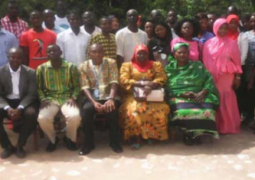
He was delivering his statement during the observance of the International Youth Day, a celebration aimed at raising public awareness and mobilizing action in support of young people.
The day was celebrated in the form of a symposium and donation of items to the Tanka Tanka Psychiatric Hospital and also served to remember the brothers and sisters, sons and daughters who suffer from mental illness, and deserved to be loved and sheltered, as well as to be provided the opportunity to seek medical attention from numerous health facilities.
Minister Jammeh said that since its inception in 1998, the Day has been celebrated in diverse ways around the world to highlight the contributions of youths to their societies and the needs and plight of young people in those societies as well.
This year’s observance focuses on “Youth and Mental Health” under the slogan: ‘Mental Health Matters’.
He said young people constitute over 63 per cent of the Gambian population, yet too little is known about their mental health status and the psychosocial implications of their daily struggles and interactions.
He said according to WHO estimates, approximately 27,000 people in The Gambia are suffering from a severe mental and/or substance abuse disorder and that a further 91,000 have a mild disorder still requiring treatment (WHO 2004).
He said a greater percentage of these victims are young people who suffer from drug induced psychosis, adding that about 40 per cent of all diagnosis of the patient population at the Tanka Tanka Psychiatric hospital are young people.
The causes of mental illness on them are numerous and include drug misuse and abuse, effects of migration by any means, trauma and accidents, discriminations among many other factors, he stated.
“Government’s zero tolerance on drugs remains a benchmark for our position in the fight against illegal and illicit drugs. Young people’s migration by any means continue to be a challenge and we recognise the fact that if not curbed, it has both short- and long-term implications on our collective socio-economic development,” he pointed out.
“We need greater knowledge about the reasons why mental health issues arise at this time, but most importantly what our individual roles are in promoting a mentally healthy youthful population,” he said.
Over the past decade, a new paradigm has emerged in the mental health field, which recognizes the importance of intervening early to maximize recovery, he added.
The youth mental health paradigm aims to change the way society thinks about the mental health of young people, and to transform and strengthen the mental health system,” he addressed.
He further stressed out that the Government of The Gambia and partners would continue to support early diagnosis and interventions around prevention and response, and also support the mental health system to adequately respond to the mental health needs of the young people.





